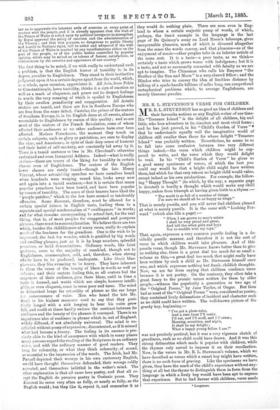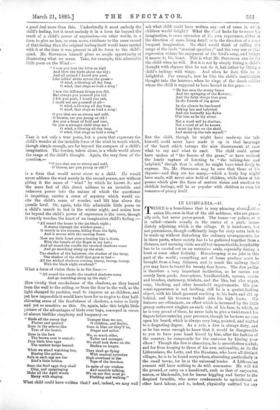MR. R. L. STEVENSON'S VERSE FOR CHILDREN.
MR. R. L. STEVENSON has as good an idea of children and their favourite notions as any English writer of our time. His "Treasure Island" is the delight of all children, big and little, who love adventure in its simplest and most vivid forms ; and he has just proved, in his "Child's Garden of Verse" * that be understands equally well the imaginative world of children still smaller than those for whose delight "Treasure
Island" was probably written. Nevertheless, he seems to us to fall into some confusion between two very different things indeed,—the verse which children might be supposed to write, and the verse which they would delight to read. In his "Child's Garden of Verse" he gives us a good many specimens of verses, of which the best you could say would be that a bright child might have written them, but which for that very reason no bright child would value, except indeed as his own productions. For example, the follow ing "Happy Thought" (to which, by the way, a separate page is devoted) is hardly a thought which would make any child happy, unless from triumph at having given birth to a rhyme :—
"The world is so full of a number of things, I'm sure we should all be as happy as kings."
That is merely puerile, and you will never find children pleased at what is merely puerile. It is the same with "Looking Forward" (which also fills a page) :—
"When I am grown to man's estate I shall be very proud and great, And tell the other girls and boys Not to meddle with my toys."
That, again, expresses a very common puerile feeling in a decidedly puerile manner, and therefore it is not the sort of verse in which children would take pleasure. And of this puerile verse, though Mr. Stevenson knows better than to give us nothing else, there is a great deal too much for so small a volume as this,—a great deal too much that might really have been written by such a child as Mr. Stevenson himself once was, and which expresses nothing but frank, childish thoughts. Now, we are far from saying that children condemn verse because it is not poetry. On the contrary, they often take a great fancy to the prosaic verses written for them by older people,—witness the popularity a generation or two ago of the "Original Poems," by Jane Taylor, of Ongar. But then bad as most of the" Original Poems " were, considered as poems, they contained lively delineations of incident and chatacter such as no child could have written. The well-known picture of the greedy boy, beginning,—
" I've got a plum-cake,
And a rare feast I'll make, I'll eat, and I'll stuff, and I'll cram ; Morning, noontime, and night, It shall be my delight ; What a happy young fellow I am !"
was not precisely poetical, but it was a very vigorous sketch of greediness, such as no child could have drawn. And it was this strong delineation which made it popular with children, while the rhymes only served to impress it on their recollection. Now, in the verses in Mr. IL L. Stevenson's volume, which we have described as verses which a smart boy might have written, there is no such force of graving. Like the specimens we have given, they have the mark of the child's experience without any thing at all but the rhyme to distinguish them in form from the language in which a lively boy would have been apt to express
that experience. But to find -favour with children, verse needs
a good. deal More than this. Undoubtedly it must embody the child's feeling, but it must embody it in a form far beyond the reach of a child's power of expression,—in other words, in a form to give no less, or even more, vividness to the mere record of that feeling than the original feeling itself would have carried with it at the time it was present in all its force to the child's mind. Mr. Stevenson himself gives us ample opportunity of illustrating what we mean. Take, for example, this admirable little poem on the Wind :—
"I saw you toss the kites on high And blow the birds about the sky ; And all around I heard you pass, Like ladies' skirts across the grass
() wind, a-blowing all day long, 0 wind, that sings so load a song !
I saw the different things you did, But always you yourself you hid. I felt you push, I heard you call, I could not see yourself at all 0 wind, a-blowing all day long, 0 wind, that sings so loud a song !
0 you that are so stronq and cold, 0 blower, are you young or old ?
Are you a beast of field and tree, Or just a stronger child than me ?
0 wind, a-blowing all day long, .0 wind, that sings so loud a song."
That is not only a true poem, bat a poem that expresses the child's wonder at the invisible force of the wind in words which, though simple enough, are far beyond the compass of a child's imagination. The burden, taken alone, is a whole world above the range of the child's thought. Again, the very form of the question,—
is a form that would never oecur to a child. He would never address the wind merely in the second person, nor without giving it the name of " wind " by which he knows it ; and the mere fact of this direct address to an invisible and unknown power into the nature of which the questioner is inquiring, carries a sense of mystery which would excite the child's sense of wonder, and lift him above the puerile level. Or, again, take this admirable little poem on a child's march to bed in the winter night, and notice how far beyond the child's power of expression is the verse, though it exactly touches the heart of an imaginative child's feeling :— "All round the house is the jet-black night ;
It stares through the window-pane ; It crawls in the corners, hiding from the light, And it moves with the moving flame.
Now my little heart goes a-beating like a drum, With the breath of the Bogie in my hair; And all round the candle the crooked shadows come And go marching along up the stair.
The shadow of the balusters, the shadow of the lamp,
The shadow of the child that goes to bed—
All the wicked shadows coming, tramp, tramp, tramp, With the black night overhead."
What a force of vision there is in the lines :—
"All round the candle the crooked shadows come And go marching along up the stair."
How vividly that crookedness of the shadows, as they leaped from the wall to the ceiling, or from the floor to the wall, as the light changed its position, used to impress us as children, and yet how impossible it would have been for us to give to that halfshivering sense of the fearfulness of shadows, a voice so lively and yet so sensitive as this. Or, again, take this bright little picture of the advantages of birds over boys, conveyed in verses of almost birdlike simplicity and buoyancy :—
" Birds all the sunny day Flutter and quarrel Here in the arbour-like Tent of the laurel. Here in the fork
The brown nest is seated ; Four little blue eggs
The mother keeps heated.
While we stand watching her, Staring like gables, Safe in each egg are the
Bird's little babies.
Soon the frail eggs they shall Chip, and upspringing Make all the April woods Merry with singing. Younger than we are, 0 children, and frailer, Soon in blue air they'll be, Singer and sailor.
We, so much older, Taller and stronger, We shall look down on the Birdies no longer.
They shall go flying With musical speeches High overhead in the Tops of the beeches.
In spite of our wisdom And sensible talking, We on our feet must go Plodding and-walking."
What child could have written that P and, indeed, we may well ask what child could have written any sort of verse in vvh:eh children would delight? What the claid looks for to rouse his imagination, is some extension of his own experience, either in the direction of more living detail, or in the direction of a more buoyant imagination. No child would think of calling tle songs of the birds "musical speeches ;" and the very use of that expression widens his enjoyment of the bird's song, and brings it nearer to his heart. This is what Mr. Stevenson can do for the child when he will. But it is not by simply fitting a child's thought with rhymes that he can do it, but rather by fitting a child's feelings with wings. And when he does this he is delightful. For example, how he lifts the child's inarticulate thought into the heavens, when he sings of the dumb soldier whom the child is supposed to have buried in the grass :—
"He has seen the starry hours And the springing of the flowers; And the fairy things that pass In the forests of the grass.
In the silence he has heard Talking bee and ladybird, And the butterfly has flown O'er him as he lay alone.
Not a word will he disclose, Not a word of all he knows. I must lay him on the shelf, And make-up the tale myself."
But the child, though he might have made-up the tale
himself, could never have made it up in that language of the heart which betrays the nice discernment at onee
what to say and what to omit. The child could never have spoken of "the forests of the grass," or have realised the lonely rapture of listening to "the talking-bee and ladybird," though that is what he might have tried dimly to
express. No, Mr. Stevenson may be sure that those of his rhymes—and they are too many,—which a lively boy might
have made, will never seize hold of children, while those of his poems which give the force of mature vision and emotion to childish feelings, will be as popular with children as even his romance of piracy itself.



































 Previous page
Previous page